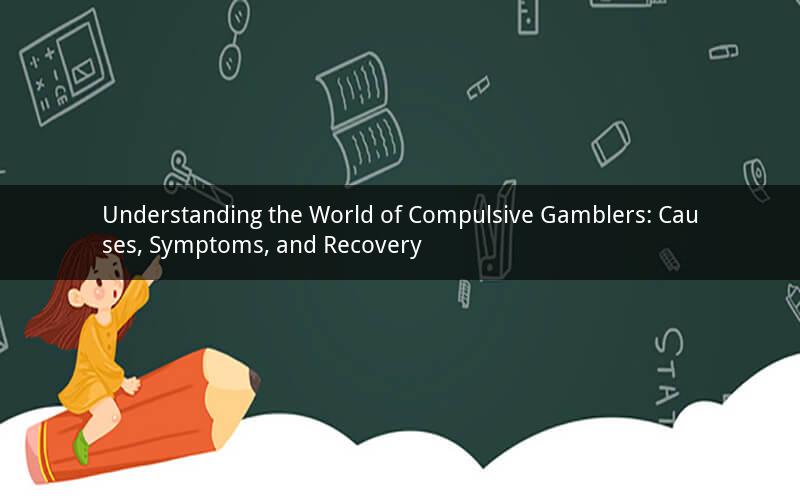
Introduction:
Compulsive gambling, also known as problem gambling or gambling addiction, is a serious condition that affects individuals of all ages, backgrounds, and socioeconomic statuses. It is characterized by an irresistible urge to gamble, despite the negative consequences it may have on one's life. In this article, we will delve into what a compulsive gambler is, the causes behind this addiction, common symptoms, and the journey towards recovery.
What is a Compulsive Gambler?
A compulsive gambler is someone who experiences an uncontrollable urge to gamble, often leading to significant problems in various aspects of their life. Unlike casual or social gamblers, a compulsive gambler's behavior is driven by an intense need to engage in gambling activities, which can become an obsession. This addiction can have severe consequences, including financial, emotional, and social problems.
Causes of Compulsive Gambling:
1. Genetic Factors:
Research suggests that there may be a genetic predisposition to compulsive gambling. Certain genes may influence the brain's reward system, making individuals more susceptible to developing this addiction.
2. Environmental Factors:
Exposure to gambling opportunities, such as casinos, online gambling platforms, and advertisements, can contribute to the development of compulsive gambling. Additionally, individuals who grow up in households where gambling is prevalent may be more likely to develop this addiction.
3. Psychological Factors:
Personality traits, such as impulsivity, thrill-seeking behavior, and low self-esteem, can increase the risk of developing compulsive gambling. Moreover, individuals who have experienced trauma or have a history of mental health disorders, such as depression or anxiety, may be more vulnerable to this addiction.
Common Symptoms of Compulsive Gambling:
1. Preoccupation with Gambling:
Compulsive gamblers often find themselves preoccupied with thoughts of gambling, even when they are not actively engaging in it. This preoccupation can interfere with daily activities, work, and relationships.
2. Loss of Control:
Individuals with compulsive gambling struggles to control their gambling behavior. They may continue to gamble despite the negative consequences, and their attempts to stop or limit their gambling often fail.
3. Escalating Bets:
Compulsive gamblers may feel the need to increase their bets to experience the same level of excitement and thrill. This escalation can lead to significant financial losses.
4. Lying to Loved Ones:
To hide their gambling habits, compulsive gamblers may lie to family, friends, and colleagues about their activities. This deception can strain relationships and lead to emotional turmoil.
5. Risking Everything:
Compulsive gamblers may risk their homes, jobs, and relationships in pursuit of gambling. They may borrow money, sell possessions, or engage in illegal activities to fund their gambling habits.
6. Emotional and Physical Health Issues:
Compulsive gambling can lead to a range of emotional and physical health problems, including anxiety, depression, insomnia, and substance abuse.
The Journey Towards Recovery:
1. Acknowledgment:
The first step towards recovery is acknowledging that one has a problem. This can be a challenging step, but it is crucial for seeking help and beginning the recovery process.
2. Seeking Professional Help:
A therapist or counselor specializing in gambling addiction can provide guidance and support throughout the recovery journey. They can help individuals develop coping strategies, address underlying issues, and develop healthy habits.
3. Support Groups:
Joining a support group, such as Gamblers Anonymous, can provide individuals with a sense of community and understanding. Sharing experiences and receiving support from others who have faced similar challenges can be incredibly beneficial.
4. Financial Management:
Recovery from compulsive gambling often involves learning to manage finances responsibly. This may include seeking financial counseling, creating a budget, and seeking help in paying off debts.
5. Building a Support System:
Surrounding oneself with supportive individuals who understand the challenges of recovery is essential. This support system can include family, friends, and professionals.
Conclusion:
Compulsive gambling is a complex addiction that affects individuals in various ways. Understanding what a compulsive gambler is, the causes behind this addiction, common symptoms, and the journey towards recovery is crucial in addressing this issue effectively. By seeking professional help, joining support groups, and building a strong support system, individuals can overcome compulsive gambling and lead a healthier, more fulfilling life.
Questions and Answers:
1. Q: Can anyone become a compulsive gambler?
A: Yes, anyone can become a compulsive gambler, regardless of age, gender, or background. Certain factors, such as genetics, environment, and psychological traits, can increase the risk.
2. Q: Is compulsive gambling a mental health disorder?
A: Yes, compulsive gambling is recognized as a mental health disorder. It is classified under the substance use and addictive disorders category in the Diagnostic and Statistical Manual of Mental Disorders (DSM-5).
3. Q: Can compulsive gambling be cured?
A: While there is no cure for compulsive gambling, it can be effectively managed and treated. With proper support and treatment, individuals can overcome their addiction and lead a healthier life.
4. Q: How can I help a loved one who is struggling with compulsive gambling?
A: Encourage your loved one to seek professional help, offer support, and be patient throughout their recovery journey. Educating yourself about compulsive gambling can also help you understand and support your loved one better.
5. Q: Are there any medications available to treat compulsive gambling?
A: Currently, there are no medications specifically designed to treat compulsive gambling. However, certain medications may help manage underlying mental health disorders, such as depression or anxiety, that may contribute to gambling addiction. Consulting a healthcare professional is essential in determining the most appropriate treatment plan.